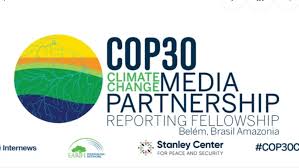The Earth Journalism Network (EJN) and the Stanley Center for Peace and Security have announced the 12 global reporters chosen to cover the landmark COP30 Climate Summit in Belém, Brazil, marking a decade since the Paris Agreement.
By HeapNews

Twelve journalists from across the world, including Nigeria’s Bunmi Yekini, Health Editor, Senior Reporter and Publisher, have been selected for the prestigious Climate Change Media Partnership (CCMP) Fellowship to cover the 30th UN Climate Change Conference (COP30) in Belém, Brazil, from November 10 to 21, 2025.
The fellowship, jointly organized by the Earth Journalism Network (EJN), a project of Internews, and the Stanley Center for Peace and Security, supports journalists from low- and middle-income countries to report directly from the global climate summit.
Other fellows include journalists from Indonesia, Brazil, Malawi, India, Mexico, the Philippines, Mongolia, Bangladesh, and Malaysia. According to EJN, more than 480 applications were received for this year’s program, with all 12 selected fellows covering a COP conference for the first time.
“This unique COP at Belém comes at a significant moment when major progress is needed to limit global warming to near 1.5°C,” said Devon Terrill, Senior Program Officer for Journalism and Media at the Stanley Center. “It is vital for journalists from countries that will be most impacted by climate inaction to shine a spotlight on the decision-making at COP30 and to enable their audiences to understand how these multilateral decisions affect them.”
For Bunmi Yekini, the fellowship presents “a rare opportunity to amplify African voices in global climate conversations.”
“Reporting from the Amazon, a region symbolic of both vulnerability and resilience, means telling stories that connect Nigerian communities to the broader global climate fight,” Yekini said. “I’m deeply honoured to represent Nigerian journalism on such a critical global stage.”
The fellowship will include orientation workshops, daily briefings, interviews with top climate negotiators, and mentorship sessions with seasoned climate journalists such as Joydeep Gupta (India), Fermín Koop (Argentina), and Imelda Abaño (Philippines).
According to James Fahn, Executive Director of EJN, the program’s support is even more crucial this year amid global financial and geopolitical uncertainties.
“This high-ambition COP comes at a time when many media houses are struggling to fund climate coverage,” Fahn said. “That makes it more important than ever to support journalists who can connect complex global negotiations to the everyday realities of people on the frontlines of climate change.”
COP30 will mark the 10th anniversary of the Paris Agreement, a milestone that scientists warn is under threat as 2024 became the first year global temperatures surpassed the 1.5°C threshold. The summit in Belém, located along the Amazon River, is expected to spotlight critical themes including forests, biodiversity, Indigenous rights, and poverty.
The conference will also see nations submit their Nationally Determined Contributions (NDCs) for 2035, while negotiators are tasked with finalizing at least 16 key decisions on adaptation, just transition, and the outcomes of the Global Stocktake.
Since its inception in 2007, the CCMP fellowship has enabled more than 500 journalists from low- and middle-income countries to attend and report on UN climate summits, giving local audiences firsthand access to global climate policy developments.
The Earth Journalism Network continues to empower over 34,000 journalists in more than 180 countries to strengthen environmental reporting, while the Stanley Center for Peace and Security drives global policy progress on climate change, nuclear disarmament, and peacebuilding.
As COP30 draws closer, the fellowship promises to enhance the depth and diversity of climate storytelling, ensuring that the global climate conversation reflects not just powerful nations but also the voices of those most affected by the crisis.
